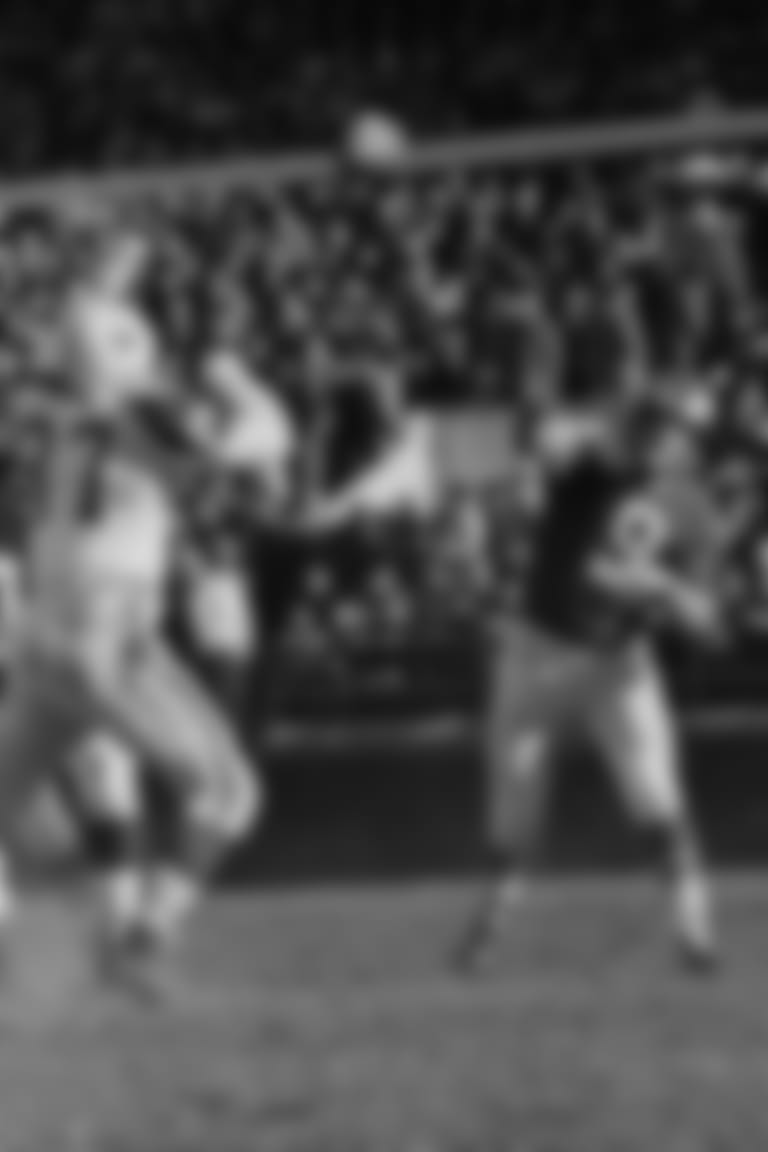Return Game: Birds, 'Boys, and Bad Blood, presented by NovaCare Rehabilitation, is the sweeping story of the Eagles and Cowboys rivalry. The 1960s saw the Philadelphia Eagles experience a stretch of highs and lows. They opened the decade as World Champions, but by the end of the decade, the team was struggling to post a winning record.
That indifference ended and the bad blood began all in one fateful game at the Cotton Bowl in December 1967. Hear the story of the play that started it all – the spark from which this rivalry was born.
INTRODUCTION
ROB ELLIS: Eagles fans say it really was the hit that started it all.
GARY PETTIGREW: The first thing you saw was Timmy getting up off the ground with blood streaming out of his mouth and his helmet off.
ROB ELLIS: It was December 1967. The Philadelphia Eagles had landed at the Cotton Bowl to take on the Dallas Cowboys. The weather was just about football perfect, 44 degrees with light wind. The Eagles had been playing better than they had in years. In an earlier matchup that season, Philadelphia beat Dallas 21-14. So the Birds were feeling confident.
RON MEDVED: Dallas was always the number one game on the schedule in terms of competition. The losses were so painful. And the wins were so sweet. It just sort of naturally became a super, super rivalry for me.
DERRICK GUNN: But Dallas being Dallas was not going to let the Eagles take them down at home. For the Cowboys, it was time to bring it ... and bring it they did.
ROB ELLIS: You are listening to Return Game: Birds,' Boys, and Bad Blood presented by NovaCare Rehabilitation. I'm Rob Ellis.
DERRICK GUNN: And I am Derrick Gunn.
ROB ELLIS: We are here to take you behind the scenes of this volatile contest between the Birds and the 'Boys. It's a rivalry that has lasted for over five decades. With no signs of letting up!
ROB ELLIS: For the Eagles, the 1960s were filled with a few ups and a few downs. But the decade started with a huge up. Eagles historian Ray Didinger starts there.
BIRTH OF A RIVAL
RAY DIDINGER: Well, the 1960 team was a sort of a genie-in-a-bottle kind of team. They weren't the best team in football. The players themselves will even tell you that. But it was one of those years where everything kind of broke their way. Their best players had great seasons all at once. They got a few lucky breaks; they will admit that. But they just got on a roll and just built confidence and built momentum and rolled right through the season.
DERRICK GUNN: One of the teams the Eagles had to roll right over was a new team out of Dallas. Lamar Hunt was the guy at the center of the story. Joe Horrigan, the retired Pro Football Hall of Fame executive director, takes it from here.
JOE HORRIGAN: In 1960, Lamar Hunt was actually trying to get a franchise in the National Football League. Twenty-seven-year-old oil-rich billionaire, but he couldn't find room. There was no room in the house. George Halas didn't want to expand, and he was kind of in charge of the expansion committee.
ROB ELLIS: If that name George Hallas rings a bell, it's because he is the legendary founder and owner of the Chicago Bears. Hunt thought, OK, NFL. If you aren't going to let me have a team, I'll show you.
DERRICK GUNN: Hunt was raised in Texas, so he knew that Texas and Texans love football. But it was mostly high school and college. But they didn't have a pro team, so Lamar Hunt wanted his franchise to be in Dallas.
JOE HORRIGAN: He decided that he would form his own league. It was called the American Football League. Now we know it is the American Football Conference. and reached out to a couple of others that had similar failures of trying to expand franchises.
DERRICK GUNN: And one of those guys was Bud Adams, the man who would become the owner of the Houston Oilers.
JOE HORRIGAN: The National Football League, when they realized that Lamar Hunt is going to actually form this new league and might make a go of it, they started saying, "Well, what can we do to stop it?"
ROB ELLIS: Turns out George Halas had a plan. He approached Bud and Lamar with an offer. Would they be willing to kill their idea of a new league for franchises of their own in the NFL? It was what they had wanted all along. Sounds like a no-brainer, right?
DERRICK GUNN: Bud and Lamar said, "No, thank you." They had given their word. Halas did not like this, so the NFL decided to try something else.
JOE HORRIGAN: The NFL then stole one of the AFL franchise pledges Max Winters, who was going to have the Minneapolis, Minnesota franchise, and offered him an opportunity to join the NFL in '61 if he would bail out of the AFL, which he did.
DERRICK GUNN: But Halas and the NFL were not ready to give up on their plans to derail Hunt and the AFL.
JOE HORRIGAN: They gave Clint Murchison a franchise for Dallas.
ROB ELLIS: Murchinson was rich on his dad's money. And when he got this offer to have a franchise in Dallas, he jumped on it.
JOE HORRIGAN: That's really how Dallas got there, as an expansion team in '60 to thwart the efforts of the American Football League to have a franchise in that city.
DERRICK GUNN: Murchison had his team, but the newly minted Cowboys didn't have a place to play.
RAY DIDINGER: They didn't have a stadium, really. So they had to play at the Cotton Bowl at that time, which was a college facility. And it was your typical expansion team. They stocked it with cast-off players from the other teams. And so naturally, the team that came into the league as the Dallas Cowboys that year was just basically a team of everybody else's leftovers.
ROB ELLIS: Not the auspicious start you may have thought for a franchise that would become known as America's Team!
DERRICK GUNN: The future rivals played their first game against each other in September 1960 at the Cotton Bowl. It was only the brand-new Cowboys' second game.
RAY DIDINGER: The Eagles go down to Dallas to play these expansion Cowboys. And the Eagles go down there and they have a terrible struggle with this expansion team. The Eagles just barely hung on and won it by two points.
DERRICK GUNN: The expansion team lost that game to the established Philadelphia team, 27-25. The Cowboys finished their inaugural season losing all their games, except one – and that was a tie – with the New York Giants.
ROB ELLIS: That year, the Eagles finished the season as champions.
ROB ELLIS: The fans would need to hold on to that championship feeling, because it would be a long time before the Eagles would win something this big again.







